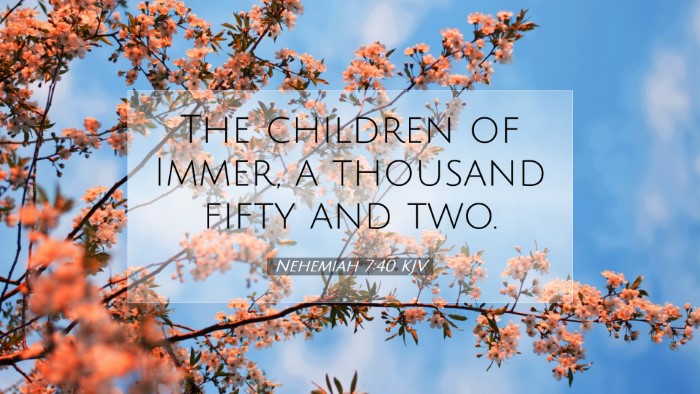Commentary on Nehemiah 7:40
Verse Context: Nehemiah 7:40 states, "The sons of Pahath-moab, of the sons of Jeshua and Joab, two thousand and eight hundred and eighteen." This verse is a part of the genealogical enumeration of the returned exiles who came back from Babylonian captivity to rebuild Jerusalem.
Historical Significance
The book of Nehemiah is crucial for understanding the restoration of Jerusalem. Following the Babylonian exile, the Jews returned to their homeland under the leadership of Nehemiah. This verse highlights the importance of lineage and the roles of specific families in the restoration efforts.
Matthew Henry remarks on the significance of these genealogies, noting that they not only serve as historical records but also as a reminder of God's faithfulness in preserving His people through the tumultuous periods of their history. The mention of Pahath-moab signifies a branch of the tribe of Judah, emphasizing the diverse backgrounds of those who returned.
Spiritual Insights
Albert Barnes elaborates on the theme of restoration in Nehemiah, suggesting that the careful enumeration of the families signifies a re-establishment of identity and community among the returned exiles. Each family represented in this verse signifies a portion of God’s plan for renewal and rebuilding not only of walls but of hope and spiritual vitality.
This reflects a vital theological principle: that God cares about the individual as well as the community. In the church today, each member contributes to the body of Christ. The precise numbers listed indicate that every soul is significant and remembered in God's plan.
The Role of Leadership
Adam Clarke emphasizes the role of leadership in these verses. Nehemiah, as a leader, took meticulous care in documenting those who returned. This reflects the need for accountability and organization within the community. Christian leaders today can take a cue from Nehemiah’s example of thoroughness and diligence in shepherding their flocks.
Clarke notes that Nehemiah's concern for the genealogy is not merely bureaucratic; it is a way of ensuring that the right people are in the right roles as the community strives to restore their city and worship. This informs modern leadership regarding the practices of inclusion, representation, and attentive pastoral care.
Theological Implications
The list of families found in Nehemiah 7, including the sons of Pahath-moab, underscores God's covenantal promises. Matthew Henry suggests that the return of Israelite families fulfills the prophecy and the hope that God would gather His people again, showing how these records are not merely historical but deeply theological in nature.
This resonates with the New Testament in which believers are also called children of God and are assured of their place in the family of faith. Just as the Israelites were counted and restored, modern believers find their identity in Christ as part of the larger narrative of redemption.
Contemporary Application
For pastors and church leaders today, Nehemiah 7:40 serves as a reminder of the importance of knowing the church community. The enumeration provides insight into how we might cultivate a sense of belonging and identity among congregants. It speaks to the need for understanding our church family and recognizing the contributions of each member.
The detailed attention to numbers and names encourages a relational approach to ministry, encouraging pastors to actively engage with their congregants and to facilitate connections among members.
Conclusion
In summary, Nehemiah 7:40 serves as a vital reminder of God’s faithfulness to His people amidst challenges. Through the insights of Matthew Henry, Albert Barnes, and Adam Clarke, we recognize the importance of community, the role of leadership, and the assurance of our identity in the family of God. As congregations seek to restore and refresh their missions, this verse stands as a testament to the ongoing work of God in the lives of individuals and communities.


